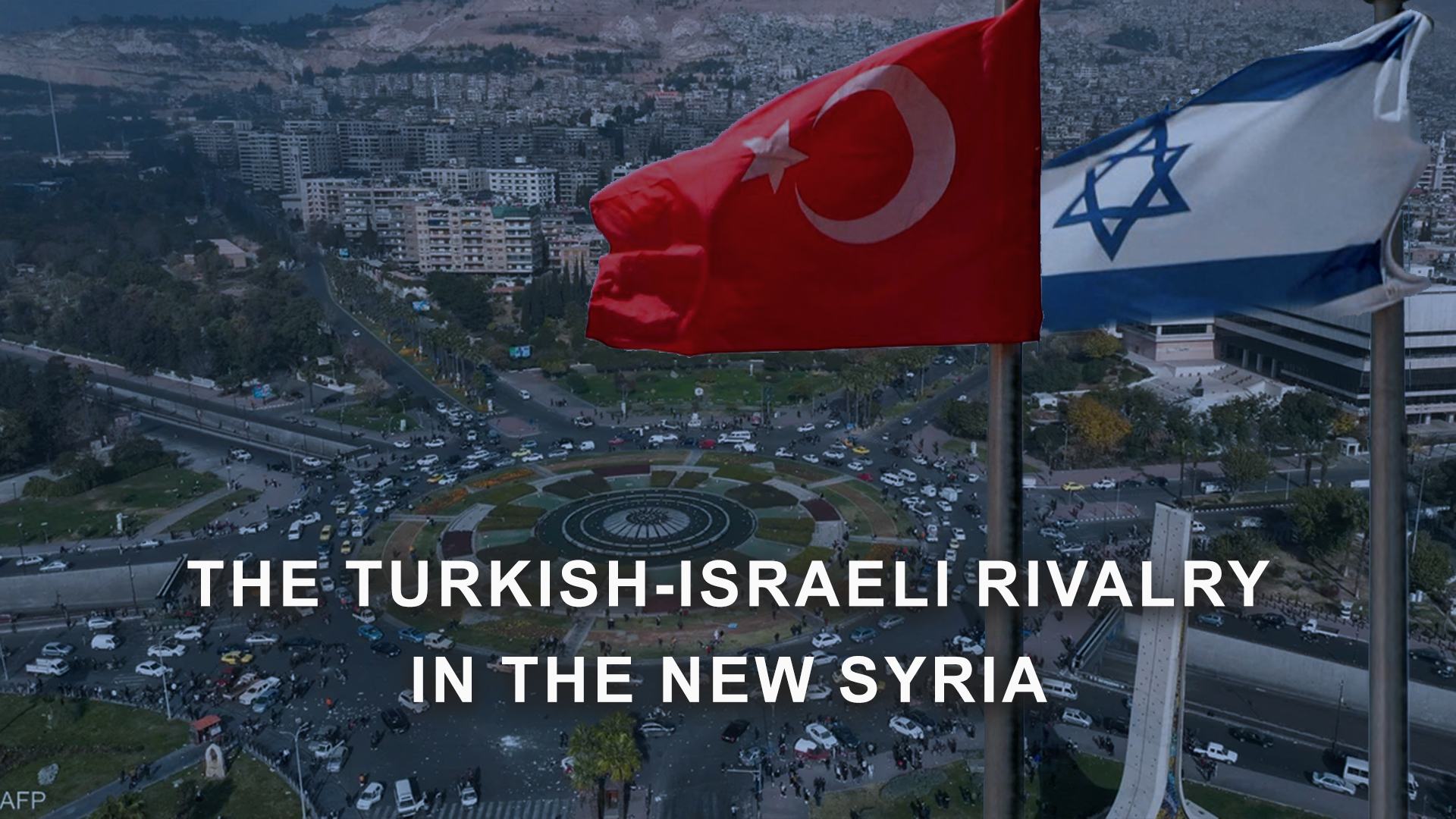The Turkish-Israeli Rivalry in the New Syria

Conflict potential…and the role of regional and international parties
Regional transformations after the fall of Bashar al-Assad’s regime and the rise of a new administration in Syria have opened the door to reshaping regional and international balances. Turkey, which has been seeking to strengthen its influence in Syria since the outbreak of the crisis, now finds itself the most prominent player on the Syrian scene. In contrast, Israel, which has long targeted the Iranian presence and has watched the situation in Syria with caution, views the growing Turkish influence with suspicion, especially with the harsh rhetoric issued by Turkish President Erdogan against Israel.
This situation creates a potential environment for a Turkish-Israeli conflict in Syria, especially in light of Conflict of strategic interests
between the two parties.
Reasons for potential tension between Türkiye and Israel in Syria
Geopolitical competition: Turkey sees Syria as a natural extension of its national security, and seeks to enhance its influence by supporting the new government and establishing military and political spheres of influence. As for Israel, it seeks to ensure its security from any regional threat, and is anxiously watching any Turkish move that might change the balance of power on the northern border .
The Turkish role in the Palestinian issue, Erdogan’s speeches in support of the Palestinians and his criticism of Israel in international forums increase tension between the two parties, and Israel sees Turkey as an ideological opponent in Syria, especially if Ankara tries to exploit the Palestinian issue to gain the support of the Arab and Syrian street.
In terms of security concerns, Turkey may support Syrian factions that Israel considers a threat to its security, such as some moderate Islamist factions that may be classified as hostile to Israel. Israel also fears that areas under Turkish power could be a platform for movements Military or logistical threats to its security.
In terms of economic competition, control over reconstruction and infrastructure projects in Syria could be a new arena for competition between Turkey and Israel, as both sides seek to secure their economic interests in the new Syria.
Possibilities of the Turkish-Israeli conflict in Syria
A hidden cold war, the two sides are likely to avoid direct conflict and resort to indirect conflict by supporting local factions or proxies in Syria.
Intelligence operations and media wars between the two sides may escalate .
Limited escalation: If Türkiye crosses Israel’s red lines, such as providing direct support to factions hostile to Israel, the latter may launch limited air strikes against targets inside Syria.
Turkey may respond indirectly through proxies or through diplomatic escalation.
The balance of deterrence and the presence of international players such as the United States and Russia may prevent a direct conflict between Türkiye and Israel, which would lead to a forced balance between the two parties.
The Arab role in containing tension
Saudi Arabia seeks to reduce Turkish power in Syria and enhance Arab power . Saudi Arabia may play a role in building an Arab alliance within the new Syria to balance Turkey and Israel together. The UAE may invest in reconstruction projects to limit Turkish and Israeli penetration. Jordan and Iraq may seek to maintain border stability and prevent any regional tensions from spilling over into their territories .
Lebanon may find itself affected by the Turkish-Israeli tension in light of its complex relations with Both parties.
The American role in preventing conflict
The United States has strong relations with both Turkey and Israel, and will seek to prevent any conflict that might threaten its interests in the region. Washington may pressure both parties to reach security coordination that ensures the stability of the new Syria.
By supporting the new administration in Syria, the United States may work to build a stable political system that prevents any escalation between regional parties, and Washington may provide economic and military assistance to the new Syria to prevent the exploitation of Turkish-Israeli tension to destabilize the country .
Washington may seek to activate the role of the international coalition to ensure stability in Syria and prevent any Turkish-Israeli confrontation.
Possible scenarios for theTurkish-Israeli conflict
1.Conditional Turkish-Israeli cooperation
If both parties realize that tension does not serve their interests, implicit understanding may be reached to avoid collision
- Limited escalation in northern Syria
The border areas between Syria and Turkey may be a scene of security tension due to conflicting interests.
- Greater international role
Perhaps American and European intervention could impose security arrangements that prevent any potential conflict between
Türkiye and Israel.
Despite the conflicting interests between Turkey and Israel in Syria, the tension is unlikely to escalate into open conflict; regional and international parties will seek to contain the tension to ensure the stability of the new Syria and prevent it from sliding into a larger regional conflict. However, Syria remains an arena for competition for influence, requiring careful management by all parties to avoid destabilizing it again.




